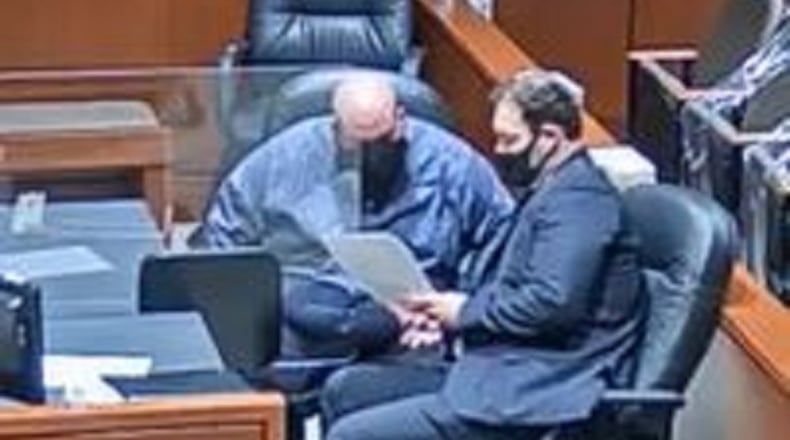The NCMEC’s role in fighting child porn began in 1998 when it started its CyberTipline.
“It was really for the public,” said John Shehan, vice president and head of the NCMEC’s Exploited Children Division. “Through the success of the program, we saw other opportunities.”
The federal law passed in 2008 and updated in 2018 requires companies providing internet or other electronic services to report, preserve for up to 90 days and make available to the NCMEC images of child porn “in order to reduce the proliferation of online child sexual exploitation and to prevent the online sexual exploitation of children.”
Already this year, the NCMEC has processed over 12 million tips from the companies.
“We’re going to surpass last year’s numbers,” Shehan predicted.
Last week, Assistant Warren County Prosecutor Travis Vieux said it was a tip from Shehan’s division, passed on last November from Google about the download of 166 images, that triggered the case against Edward L. Studebaker, 30, of Lebanon.
The case was referred to the Internet Crimes Against Children task force in Cleveland.
The ICAC used the Internet Protocol address of the suspect’s computer to track its location,
Detective Timothy Cooper, Lebanon’s department’s ICAC liaison, “started the investigation on our end,” Lebanon Police Chief Jeff Mitchell said.
Cooper, specially trained in computer forensics, is the department’s digital evidence recovery specialist.
“That’s part of our commitment as a police agency,” Mitchell said. “We don’t want to take any risk of losing the evidence or not being able to conduct an investigation.”
On Jan 18, police searched Studebaker’s residence and seized his electronics.
The investigation showed Studebaker downloaded the images, some depicting children having sex or nude children, and uploaded them onto his phone, Vieux said during Studebaker’s plea hearing.
Studebaker was indicted in April on five counts of pandering sexually oriented matter involving a minor and 24 counts of illegal use of a minor in a nudity-oriented material or performance between Nov. 21, 2019, and Jan.18, 2020.
During last week’s hearing, Studebaker admitted to the allegations read by Vieux and was found guilty of five counts of pandering sexually oriented materials involving a minor and seven counts of illegal use of a minor in nudity oriented display.
He faces up to 18 months in prison and a $5,000 fine on each pandering count and 12 months and a $2,500 fine on each illegal use count.
Prison isn’t mandatory or “presumed” under state law.
Studebaker was referred for an investigation that would, among other things, determine if he could serve time in community-based correctional facility, rather than prison.
Originally facing 29 child pornography charges, Studebaker was denied treatment in lieu of to conviction (ILC) by Judge Donald Oda II.
He has no prior criminal record, works and is married with two children, lawyer Steve Kilburn told Oda in hopes of the ILC alternative.
In addition, Studebaker has a “long history of mental illness” triggered by abuse as a child, Kilburn said at the ILC hearing.
“It is a way he dealt with it,” Kilburn said.
“I am remorseful for what I’ve done,” Studebaker said during the hearing. “I ask that you give me a chance. You won’t hear my name in a bad term ever again.”
Studebaker, who served two days in jail after his arrest in January, remained free Tuesday on $30,000 bond. His sentencing is scheduled for Nov. 12.
Kilburn said it was his second defense in a case originating from a NCMEC tip.
In Studebaker’s case, Kilburn emphasized, “He never generated any of these images. He never took them. He never shared them with anyone.”
Although named the National Center for Missing & Exploited Children, the center actually handles tips from around the world and collaborates with 125 law-enforcement agencies globally.
“It’s a global problem,” Shehan said.
In a case involving a NCMEC tip from Facebook, Alexander P. Bebris, former Oakwood public safety director, now living in Denmark, Wis., is scheduled for a plea hearing in federal court in November in Wisconsin. Bebris is accused of distributing child porn in September 2018.
The first priority for NCMEC tips is reviewing the images to determine if the children depicted are in immediate danger. Shehan also manages 30 staffers focused on victim identification.
In 2019, 150,667 of the nearly 16.9 million tips came from the “general public,” according to the NCMEC.
The NCMEC also took in 69.1 million images, videos and other files.
“To date, over 1,400 companies are registered to make reports to NCMEC’s CyberTipline,” according to the NCMEC website.
In 2019, Facebook and associated companies made nearly 15.9 million reports, Google 449,283 and Microsoft 123,839.
This doesn’t necessarily reflect the amount of child porn in their systems.
“Every company’s a little bit different,” Shehan said.
The law requires companies to report if aware of child porn in their systems.
“They’re not required to take any steps,” Shehan said.
Facebook uses technology to identify images and “grooming” efforts by child pornographers, Shenan said.
In 2017, Google donated Cloud Platform technologies to NCMEC. Google also works with NCMEC’s engineers and analysts “to brainstorm technology solutions and build customized tools.”
Other companies are less aggressive, Shehan added.
Since 1998, the tipline has generated 77.5 million reports.
This is only part of the non-profit NCMEC’s mission.
It also helps find missing children, reduce child sexual exploitation and prevent child victimization. It also “works with families, victims, private industry, law enforcement, and the public to assist with preventing child abductions, recovering missing children, and providing services to deter and combat child sexual exploitation.”
To get help and report a sexual abuse image, nudity or damaging online comments, visit: http://www.missingkids.com/gethelpnow/isyourexplicitcontentoutthere.
The 24-hour toll-free hotline number is 1-800-THE-LOST. (1-800-843-5678).
About the Author



